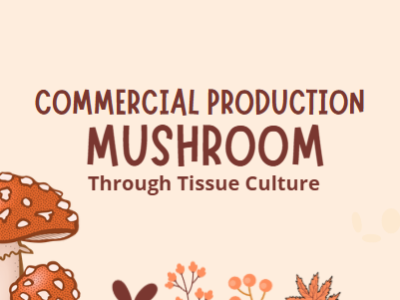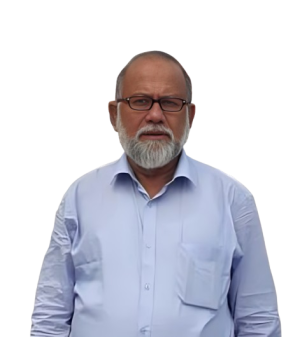
Commercial Production of Mushroom Through Tissue Culture - Registration 🍄
Course Code: MC55003
Course Title: Commercial Production of Mushroom Through Tissue Culture
Start Date: September 20, 2025 📅
Duration: 26 hours (13 weeks, 2 hours per class) ⏰
Mode: Blended (primarily in-person, occasional online sessions) 🌐
Class Size: 20 participants 👥
Course Equivalent: 2 Credit Hours
Course Fee: 5,000 BDT (3,000 BDT with 40% early registration discount) 💸
Course Description 🚀
Commercial Production of Mushroom Through Tissue Culture (MC55003) addresses the 25% rise in mushroom demand in Bangladesh (DAE, 2022) and the shortage of skilled technicians in tissue culture, as noted by BARI (2021-22). This course equips learners with hands-on skills in producing high-quality mushroom spawn using tissue culture, supporting year-round cultivation and agri-biotech growth (BHTPA, 2022). Through lab work and fieldwork, participants will master mycelium propagation and commercial production, preparing for careers in mushroom farming, spawn labs, and agripreneurship. 🌟
Syllabus 📚\
Week 1: Intro to Mushroom Cultivation – Industry overview, mushroom benefits. Activities: Market analysis discussion. Resources: DAE reports. 🍄\
Week 2: Mushroom Biology – Life cycle, mycelium development. Activities: Morphology quiz. Resources: Stamets’ The Mushroom Cultivator. 📖\
Week 3: Lab Setup – Tissue culture lab design, equipment. Activities: Lab layout planning. Resources: Laminar airflow, autoclave. 🧪\
Week 4: Sterilization & Safety – Aseptic techniques, PPE. Activities: Sterilization demo. Resources: Safety protocols. 🧤\
Week 5: Media Preparation – PDA, MEA formulation, pH adjustment. Activities: Media prep lab. Resources: Agar, peptone. 🧫\
Week 6: Tissue Culture Techniques – Explant selection, inoculation. Activities: Mycelium culturing. Resources: Incubation chambers. 🌱\
Week 7: Disease Management – Contamination detection, control. Activities: Disease identification lab. Resources: Testing kits. 🔍\
Week 8: Acclimatization – Hardening, substrate adaptation. Activities: Hardening practice. Resources: Substrate samples. 🌿\
Weeks 9-10: Commercial Cultivation – Substrate prep, spawning, harvesting. Activities: Bagging demo. Resources: Straw, sawdust. 🛠️\
Week 11: Entrepreneurship – Costing, market linkages, export. Activities: Business plan workshop. Resources: BHTPA reports. 💼\
Week 12: Field Visit – Commercial farm tour. Activities: On-site observation. Resources: Partner farms. 🚜\
Week 13: Project Writing – IYCF program proposal. Activities: Proposal presentation. Resources: Project templates. 📝
Learning Outcomes ✅
Participants will:
Explain mushroom morphology and life cycle. 📚
Design and maintain a tissue culture lab. 🧪
Operate lab equipment for spawn production. 🛠️
Prepare and optimize culture media. 🧫
Apply aseptic techniques for mycelium propagation. 🌱
Control incubation conditions (light, temperature, humidity). 🌡️
Detect and manage contamination/diseases. 🔍
Acclimatize mycelium for substrate cultivation. 🌿
Plan commercial mushroom production. 🏭
Develop entrepreneurial skills for mushroom ventures. 💼
Apply standards for local/export markets. ✅
Target Audience 🎓\
Biotechnology, microbiology, agriculture students.
Mushroom farmers, agripreneurs, lab technicians.
Agri-biotech/food processing professionals.
Entry Requirements 📋\
HSC or equivalent; preferably in biotechnology, agriculture, or related fields.
Basic knowledge of plant/fungal biology and lab safety.
Minimum age: 19 years.
Career Pathways 🚀\
Mushroom production specialists, spawn lab managers.
Agri-biotech entrepreneurs, extension workers.
Roles in ACI Agribusiness, government projects.
MSc/PhD in mycology, agricultural biotechnology.
Professional Certificate in Mushroom Tissue Culture.




Join thousands of students already enrolled
Lifetime access
Certificate included
30-day money back